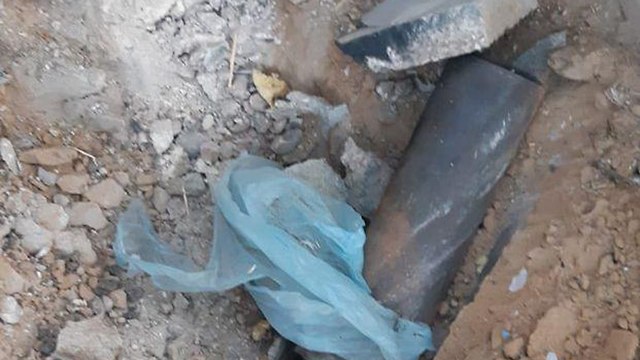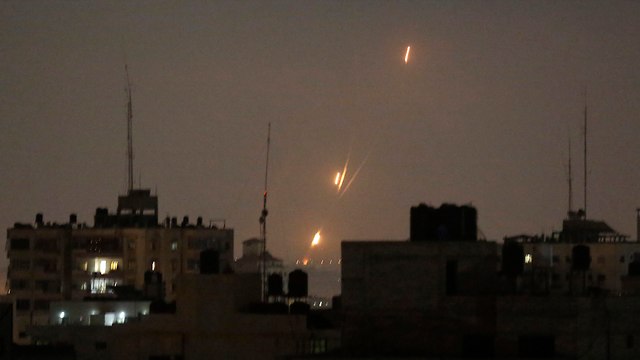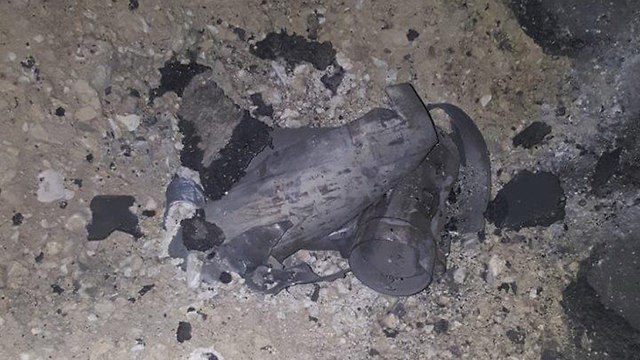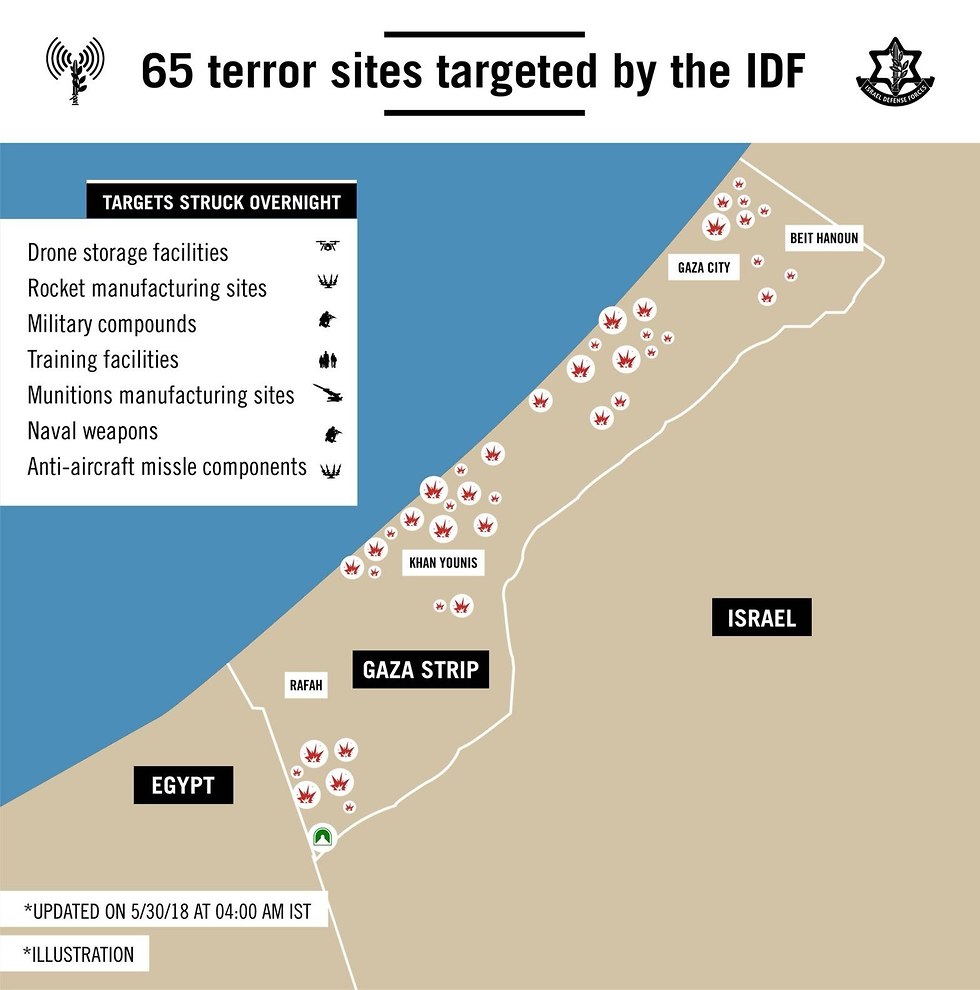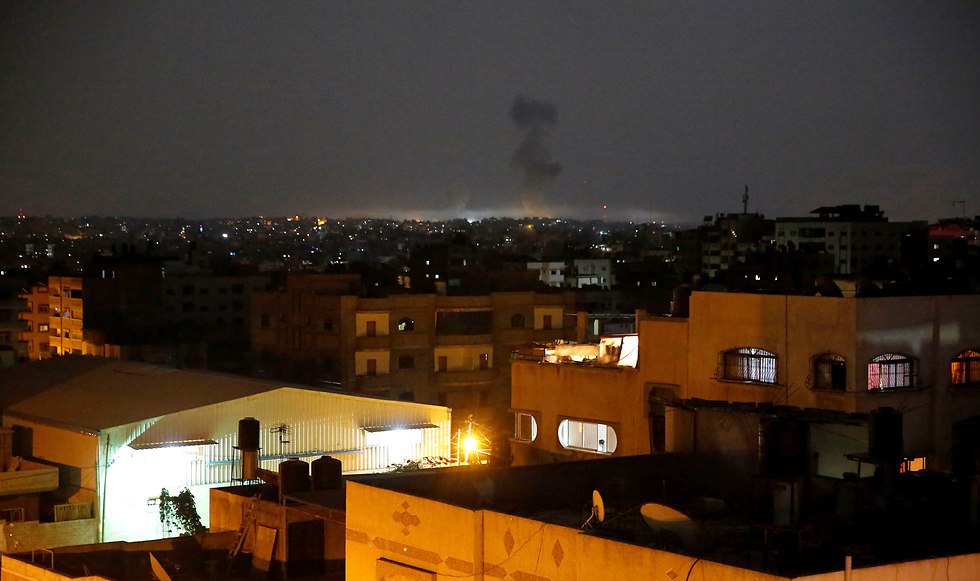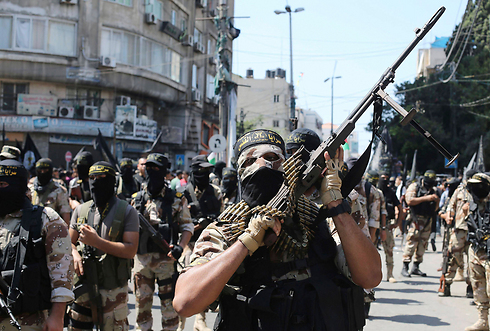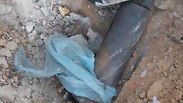

Eshkol residence suffers direct hit, no one harmed
Hamas deputy leaders iterates Palestinian factions' commitment to ceasefire attained with Egyptian mediation insofar as Israel is committed; an hour later, alarms blare once again; 2 landings identified in Eshkol Regional Council; schools to operate normally despite tensions; IDF attacked 65 targets in Gaza since Tuesday.
The council reported that two rockets fell in two communities, one of them hitting the home.
Six people suffered light contusions running to shelters due to southern region alarms, and were taken to the Barzilai Medical Center in Ashkelon.
Two people who suffered anxiety attacks were also taken to the hospital.
In total, three Sderot residents, three Netiv HaAsara residents and two Ashkelon residents were taken to the southern city's hospital.
They were all since released, except for one person who was hospitalized due to a leg wound.
The launches occurred a little over an hour after Hamas's deputy leader Khalil al-Hayya released a statement saying the Palestinian faction will be committed to a ceasefire insofar as Israel will be committed to one.
Despite an earlier announcement of a ceasefire, Code Red alarms sounded twice through the night—first some time after midnight and then again at 2am.
Two hours later, al-Hayya issued a statement saying, "After succeeding in preventing Israel from trying to force a change to the rules of the game regarding armed conflict, several mediators interceded and agreements were reached to return to a ceasefire situation in Gaza."
Echoing his claim, Palestinian sources said the Gaza factions will continue launching projectiles at Israel so long as it continues to carry out strikes in the strip, adding that said strikes served as justification for a volley of mortars at 5am Wednesday, which included the direct hit on the Eshkol residence.
Despite the alarms blaring throughout the night, authorities decided schools would operate normally in all of the Israeli communities surrounding the Gaza Strip.
Multiple Code Red sirens blared in the early morning Wednesday in communities in the Eshkol, Sha'ar HaNegev and Sdot Negev regional councils, preceded by sirens sounding all through the night as well in the aforementioned councils as well as at the Bnei Shimon and Merhavim regional councils and the cities of Ashkelon and Netivot.
The IDF Spokesperson's Unit said that following the Code Red sirens, several launches were identified from Gaza towards the Sha'ar HaNegev, Eshkol and Sdot Negev regional councils.
Some of the rockets launched at Sha'ar HaNegev and Sdot Negev were intercepted by the Iron Dome, the army added. The remaining alarms triggered were false alarms.
In retaliation to the Gaza fire at Israel throughout the day Tuesday, Israeli Air Force fighter jets, helicopter and other aircrafts attacked about 25 Hamas terror targets in the strip, starting at 11:30pm.
The IDF said that among the targets were drone storage facilities, rocket and armament manufacturing installations, training camps, military installations, advanced naval armaments and antiaircraft missile components.
The most recent strikes joined some 40 sites targeted Tuesday, totaling 65 targets since Tuesday.
The IDF explained that this was a "further wave of strikes against targets belonging to Hamas, which is responsible for all goings-on in and coming out of the Gaza Strip, including the serious assaults on Israel's citizens."
"Hamas again chose to operate against the interests of the strip's citizens, and after failing in the violent riots it orchestrated along the security fence, it chose to launch a widespread projectile attack against Israelis," the army's statement continued.
"The IDF views Hamas's terrorist actions gravely and will continue to operate to thwart it decisively and with force. The IDF is prepared to realize its objectives for a wide variety of scenarios," the statement concluded.
Some of the projectiles launched at Israel since the escalation began, the army noted, where rockets manufactured in Iran.
A Palestinian source told Ynet before the announcement of the ceasefire that Hamas contacted the Islamic Jihad with a message from Egypt saying that escalation should be stopped short of war.
The Islamic Jihad, for its part, was said to have responded that it would not accede to instructions from a third party and that anyone wishing to converse should do so directly.
This prompted direct talks between the terror group and senior Egyptian intelligence officials starting in the early afternoon Tuesday, demanding a ceasefire is reached.
While the Islamic Jihad ostensibly agreed, it conditioned the ceasefire on the manner of the Israeli military response. The source also noted that with its own strikes on Israel, the Islamic Jihad signaled it did not seek overall escalation by making it a point to not fire long-range rockets at targets farther away in Israel.
Palestinian sources said the agreement reached was based on understandings attained at the end of Operation Protective Edge.
Shortly after midnight, the Islamic Jihad said it would retaliate to "any aggression if Israel did not remain committed to the ceasefire understating."
The United States has called to hold an emergency session of the United Nations Security Council following the escalation in Gaza. The hearing will be held later Wednesday.
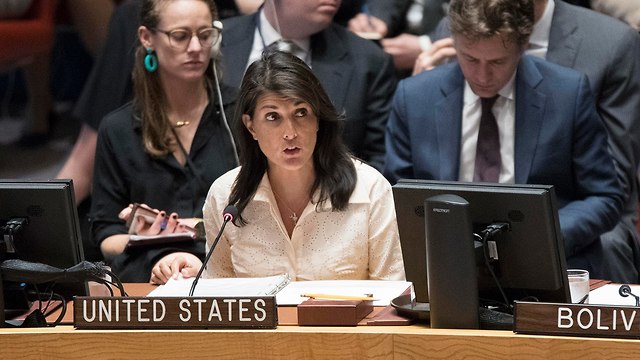
US Ambassador to the UN Nikki Haley said that the Security Council should be "outraged and respond" to the most expansive attack on Israel since 2014, which she said was "directed at innocent Israeli civilians."
"The Palestinian leadership needs to be held accountable for what they're allowing to happen in Gaza," the American diplomat added.
Israel's Ambassador to the United Nations Danny Danon also commented on the situation before the Council's meeting, saying that holding the session was a "positive step. But the Council's members must take serious action, and not make do with words."
"I call upon the Security Council to officially recognize Hamas as a terror group," he demanded.














